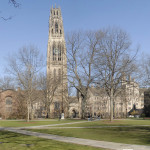Whiteness is sitting on the bus at the age of six, on your way to kindergarten, and being called “that weird chink kid” from a fifth grader sitting in the back. It’s the collective stares that all the kids give you, the American kids who come from big, loving homes full of families who speak English, that make you feel like an animal in a zoo while they are the spectators. It’s the feeling of inferiority that ignites every time your classmates share stories about their families—families that eat dinner together at 6pm every night, with dinner plates decorated with roast beef, steak, and peas. You feel different hearing these stories, thinking about how you must eat alone, how you must wait for your parents to come home from work at 11pm every evening in order to first see them. Although you don’t understand it yet, your upbringing—in an eighty percent white town on middle-class, suburban Long Island—will shape how you view the world. You may currently be a naïve elementary school student who cannot yet fully understand racial difference, but you are already beginning to realize it around you. Nobody looks like you. Nobody is embarrassed to speak to their grandmothers, in their native tongues, at the bus stop like you are. Nobody lives like you must.
Whiteness is your mother, sleepy-eyed and sick, telling you to cancel the order that you helped her make because the customer thinks that her General Tso’s Chicken is made of dog. As an enthusiastic sixth grader helping his parents out at their Chinese takeout restaurant, you’re confused—why are people making up lies about your food, about your culture? At eleven, you are beginning to connect the dots—understanding how your race and class define how your classmates and teachers view you. But you begin to foolishly internalize this difference, because you think that you don’t have any other options. Everyone on this island is white. You no longer bring in the xiaolongbaos that your grandmother packs for you for lunch every morning, instead opting to buy your lunch in the cafeterias—green beans, mashed potatoes, and chocolate milk on plastic trays. You start to tell your dad to pick you up two blocks from the school, because you don’t want your classmates seeing his worn-down Camry that he uses as a delivery car, and you certainly don’t want them to hear his strong Chinese accent. You want to be white now.
Whiteness is coming out as gay during your freshman year of high school in an English presentation, after years of hiding in the shadows in fear of prejudice from your classmates, teachers, and family members. Your class gives you a half-hearted clap, and then vehemently lauds and hugs the popular, white gay for his presentation on RuPaul’s Drag Race. It’s your classmates’ silence that diminishes you when you build up the courage to share your historical and generational trauma, queer and Asian experiences, and insecurities as a translator for your parents—ones that have been pent up for years now, the ones that you’ve never had the vocabulary to articulate, nor have had anybody to discuss it with. You realize, now, that you still do not.
Whiteness is the dichotomy between resenting the structures that racially otherize you, while still envying your white peers. They do not ever have to think about their place in their own communities, the obstacles their families overcame to get to the United States, nor the tensions between their family’s dogmatic values of marriage and their own sexualities. You wonder throughout the rest of your high school experience if you should speak out about their silence. Is it wrong of them to be apathetic towards your experiences, and should you resent them? Should you still be friends with people who don’t have a culture, community, or identity? Or, perhaps, are you being selfish, because if you were white like them, would you care, would you stay insulated in an ignorant bubble like theirs? You choose not to say anything—they just won’t understand your frustration.
Whiteness is beginning to cascade into your first year of university. It’s being a young adult now, yet still having difficulties grappling with your identities, still feeling the same sentiments of inferiority that you felt in kindergarten at a seemingly “diverse” institution. It’s going through your lowest points first semester, yet not wanting to find a therapist to talk about your queer and Asian struggles, simply because no counselor is queer and Asian. It’s then you seeing Rumpus Magazine’s 50 Most Beautiful List decorating every residential college dining hall, as you wonder why hardly anybody who looks like you are on it. You attend a Pride Parade over the summer, but only notice the white men being applauded for their courage, bravery, and masculinity that even the gay community aestheticizes. It’s the continuous internalization of these beauty ideals—the same ones that you see plastered on billboards and on television—that you continue to actively yearn for them in yourself. You spend $80 on colored contacts, despite your perfect vision, telling yourself that you want to try them out for fun, but internally, you know it is to look more like the lighter-eyed white men that society cherishes. You also want these beauty ideals in your partner—you swipe right on more of the white men that you see on Tinder, because you have been conditioned to think that they are more attractive. You are growing up, yet you still want to be white.
Whiteness, now, serves a lens through which I view myself. This is facilitated, ironically, by Yale—a predominately white institution. College has served as a space for me to transition into adulthood, a space where I am separated by full-fledged whiteness, one in which I now have room and headspace to contemplate my own identity. I am grateful for the courses that Yale has offered me during my first year, as they have informed me of my racial difference. I learned about W.E.B. Du Bois’ theory of double consciousness, and it has not left my mind since. His concept of being unable to reconcile his black identity with whiteness rings similarly in my life—my Asian and “American” identities are partitioned. Like Du Bois, I view myself and my intersectionality through different compartments. My upbringing, entrenched in whiteness, has conditioned me to view my queer, my immigrant, my low-income, and my first-generation identities through its very framework. Through academic scholarship, I am now starting to realize how applicable other experiences are to mine—granting me a new perspective through which I am hyper-cognizant of racism: not only the blatant discrimination and microaggressions perpetuated by my ignorant Long Island classmates, but also the structures and systems in place that foster whiteness.
I cannot honestly say that my transition from childhood into young adulthood was profound in me completely dismantling whiteness from my life. Rather, it has allowed me to shift my conceptions and paradigms of how whiteness fits into my world, and how insidiously it operates throughout space and time. Looking back to my first day of kindergarten, I now question why a fifth-grade bully called me by a racial slur. I think back to Professor Mary Lui’s Asian American History course, remembering the valences of the 1882 Chinese Exclusion Act, understanding the legacies of state and legally-codified racism and otherization of Asians in the United States. Like the Chinese migrant workers, I continue to be excluded. I also look back to my queerness and to my class, wondering why I feel inferior being the son of restaurant owners or being a queer, Asian person. I realize how these sentiments of “otherness” have been imposed on people of color—particularly Asian Americans—since their migrations to the United States. I understand now how racism is rooted in history, and how white privilege and institutional white supremacy continue to be in tension with my identity. I now have a new epistemology to think about my life—through the lens of Du Bois and many other historians and scholars.
Whiteness is still a facet of my life I struggle with, and I still have difficulties grappling with my identity. When I hear about my classmates at Yale, who are the sons and daughters of white millionaires, or when I go back to Long Island and see the spatial differentiation of power between my mother behind the counter and a wealthy, white woman whom she is serving—I still taste my historic inferiority. However, my new perspective on the world allows me to constantly probe and challenge these racial dynamics. My ethnic studies classes and my ER&M major provide me with the academic space to study racial difference; my second home at the Asian American Cultural Center then allows me to contemplate and act on how I resist this difference. Lastly, I no longer view myself as a victim to whiteness, nor do I still feel the need to constantly internalize it. Reflecting now upon my youth, as a young adult and college student, I realize the sheer agency that I have exercised. As a queer, low-income immigrant of color, with racial and class odds against me, I have risen above whiteness and have overcome its hegemony. Whiteness is now changing the ways through which I view my own intersectional identity, which now informs and empowers my agency.
~Kevin Chen


